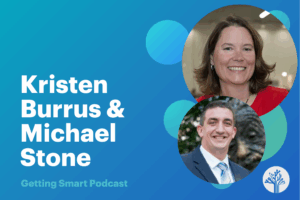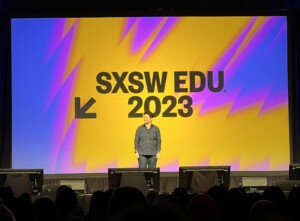Digital Learning Leads to Deeper Learning

We think digital learning can lead to deeper learning. We’re writing a paper with a framework of evidence. A little brainstorming led to a list of ten benefits we’ve seen:
- Engagement: media that grabs attention
- Motivation: encouragement to go deeper
- Persistence: capturing more learning hours per day
- Production: ability to publish high quality work product
- Presentation: professional quality presentations
- Personalization: customized learning experiences
- Access: 24/7 access to great teachers and content
- Collaboration: instant interest and subject groups
- Acceleration: more and faster performance feedback
- Options: many new pathways to mastery
We could add convenience—the ability to vary rate, time, and location—to the list as an important to some older students. We’re beginning to see more tech-enabled solutions for students with special needs. Special tech benefits for special kids can open the door to deeper learning for students that previously wouldn’t have had a shot.
Another way to look at benefits is to think about the learning activities. Well constructed tech-enabled learning leads to:
- More writing
- More thinking
- More motivation
- More automaticity
- More time on higher order teaching
- More higher order practice (using games & sims)
- More publishing to wider audiences
- More investigating
- More collaborating
- More making, inventing, & creating
We could add asking more big questions, engaging in more big projects, and digger deeper into subjects.
Another way to think about this is the potential to view tech-enabled students as:
- Journalists
- Producers
- Scientists
- Historians
- Inventors
- Entrepreneurs
- Problem-solvers
- Project-managers
- Collaborators
- Learning coaches







Roy
I think the ideal framework would be a condensed version of the middle list (the one starting with 'more...'). Instead of ten, I would only list five, mostly because I think with lists, less is more, and partly because I think many of your ten can be consolidated. Here are my five: more higher order skills practice, more motivation and engagement, more project based learning, more information on student performance, and more time to teach higher order thinking skills.
I believe the last two are especially important in highlighting the benefits of blended learning to teachers. We've been increasingly interested in the blended learning space--particularly in rotation models--and our work with schools, platform providers, and content providers continually reinforce the importance of teacher buy in.
Good luck with your work. As always, I look forward to hearing about your findings and in particular, the work at individual schools around blended learning.
Val Jones
The list I find most useful depends on with which of my main audiences I am communicating at a point in time. In my rural public school district, where our initiative is to provide as much technology in as many great ways as we can to our kids, the first list delineating benefits would appeal to administrators. The second list from the activities vantage point I would share with teachers. Finally, the roles list would speak to students and parents. Therefore, I like all three lists.
John Bennett
For me, digital learning enables elimination of or at least deemphasis of textbook use. This in turn increases the likelihood of including less obvious connections and of encountering contradictory information. Both increase the importance of evaluating the usefulness and organization of the broader range of sources. This for sure leads to deeper learning!
Gabrielle
Digital learning and deeper learning, while not synonymous can be intertwined through the pairing of crafted learning experience with technology. My perspective from the classroom, is that teachers often devote too much time teaching the technology, which is often intuitive, and too little time crafting experiences that promote the benifits of deeper learning.